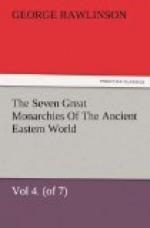The trading spirit which was thus strongly developed in the Babylonian people led naturally to the two somewhat opposite vices of avarice and over-luxuriousness. Not content with honorable gains, the Babylonians “coveted an evil covetousness,” as we learn both from Habakkuk and Jeremiah. The “shameful custom” mentioned by Herodotus, which required as a religious duty that every Babylonian woman, rich or poor, highborn or humble, should once in her life prostitute herself in the temple of Beltis, was probably based on the desire of attracting strangers to the capital, who would either bring with them valuable commodities or purchase the productions of the country. The public auction of marriageable virgins had most likely a similar intention. If we may believe Curtius, strangers might at any time purchase the gratification of any passion they might feel, from the avarice of parents or husbands.
The luxury of the Babylonians is a constant theme with both sacred and profane writers. The “daughter of the Chaldaeans” was “tender and delicate,” “given to pleasures,” apt to “dwell carelessly.” Her young men made themselves “as princes to look at—exceeding in dyed attire upon their heads,”—painting their faces, wearing earrings, and clothing themselves in robes of soft and rich material. Extensive polygamy prevailed. The pleasures of the table were carried to excess. Drunkenness was common. Rich unguents were invented. The tables groaned under the weight of gold and silver plate. In every possible way the Babylonians practised luxuriousness of living, and in respect of softness and self-indulgence they certainly did not fall short of any nation of antiquity.
There was, however, a harder and sterner side to the Babylonian character. Despite their love of luxury, they were at all times brave and skilful in war; and, during the period of their greatest strength, they were one of the most formidable of all the nations of the East. Habakkuk describes them, drawing evidently from the life, as “bitter and hasty,” and again as “terrible and dreadful—their horses’ hoofs swifter than the leopard’s, and more fierce than the evening wolves.” Hence they “smote the people in wrath with a continual stroke”—they “made the earth to tremble, and did shake kingdoms”—they carried all before them in their great enterprises, seldom allowing themselves to be foiled by resistance, or turned from their course by pity. Exercised for centuries in long and fierce wars with the well-armed and well-disciplined Assyrians, they were no sooner quit of this enemy, and able to take an aggressive attitude, than they showed themselves no unworthy successors of that long-dominant nation, so far as energy, valor, and military skill constitute desert. They carried their victorious arms from the shores of the Persian Gulf to the banks of the Nile; wherever they went, they rapidly established their power, crushing all resistance, and fully meriting the remarkable title, which they seem to have received from those who had felt their attacks, of “the hammer of the whole earth.”




